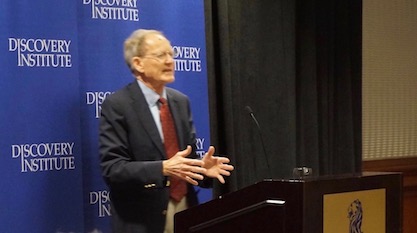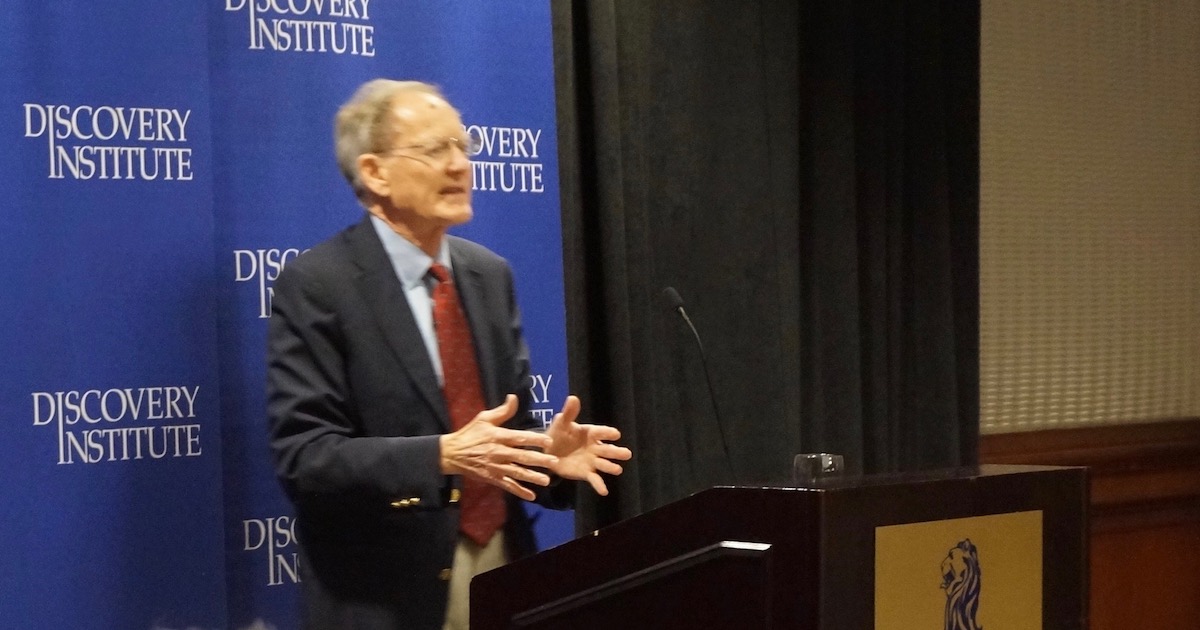 Neuroscience & Mind
Neuroscience & Mind
Life After Google — Gilder’s Vision


There was a wonderful interview with Discovery Institute co-founder George Gilder in this past weekend’s Wall Street Journal. Pegging the conversation to the release of Life After Google, Gilder’s new book, interviewer Tunku Varadarajan gives a fine sketch of not only the ideas but the personality behind the ideas. Excerpt:
Mr. Gilder, 78, is still immersed in the world of tech, but he doesn’t like all that he sees. Google makes him mad, as does Silicon Valley more broadly, and his ire is directed at the “new catastrophe theory” which holds “that artificial intelligence will make human minds obsolete, and that we’ll soon produce machine-learning tools and robotics that excel the capabilities of human brains.” He calls this attitude “Google Marxism” — a phrase he utters with a certain salivary distaste — “because Marx’s essential theme was that the Industrial Revolution of the 19th century had overcome all the challenges of production.” From that point on, Marx held, “human beings would focus on redistributing wealth among the classes rather than creating it.”
Marx was convinced that the steam turbine, electrification and what William Blake called “dark satanic mills” were a final stage in social evolution — “an eschaton.” Mr. Gilder loves abstruse words, and this one, which signifies a kind of climax in human attainment, is a particular favorite. “Google and the Silicon Valley people also imagine that their artificial intelligence, their machine learning, their cloud computing, is an eschaton — another ‘end of history’ moment. And it’s just preposterous.”
In truth, Mr. Gilder says, Google is at the end of its “paradigm,” which he defines as “avoiding the challenge of security across the internet by giving away most of its products for free, and financing itself with an ingenious advertising strategy.” Mr. Gilder also contends that Google believes capitalism is at an end — that “this is the winner-take-all universe,” as he puts it, “and the existing generation of capitalists are the final capitalists. That’s their vision.”
Note the word “vision.” I’ll come back to it. A vision can be true to reality, or not. Healthy and affirming, or unhealthy and corrosive.
And if you believe that “machines can re-create new machines in a steady cascade of greater capabilities that are beyond human comprehension and control, you really believe that’s the end of the human race.”
Mr. Gilder rejects the premise. “Machines can’t be minds,” he says. “Information theory shows that.” Citing Claude Shannon, the American mathematician acknowledged as the father of information theory, Mr. Gilder says that “information is surprise. Creativity always comes as a surprise to us. If it wasn’t surprising, we wouldn’t need it.” However useful they may be, “machines are not capable of creativity.” Human minds can generate counterfactuals, imaginative flights, dreams. By contrast, “a surprise in a machine is a breakdown. You don’t want your machines to have surprising outcomes!”
More than a Polymath
The only point I’d highlight for disagreement is Varadarajan’s characterization of Gilder as a “polymath” — “one of a dwindling breed of polymath Americans who thrive in a society obsessed with intellectual silos.” That is true but it falls short of capturing what makes Gilder stand out as he does. A polymath, the opposite of a technical specialist, knows a lot about many disparate things. But those things may not be joined together in any respect more profound than that they are known by this single person.
Across George’s 20 books I think there’s much more than that. There is a vision uniting them. It has to do with human creativity and human exceptionalism, the place of man in the cosmos. Of course there is more to a vision than an idea capable of being rendered in three paragraphs, but Discovery Institute’s Mission Statement is not a bad attempt. It’s the quality of vision that’s most painfully lacking in our intellectual and moral leaders, not merely diverse or polymathic knowledge.
Here is George talking with C-SPAN about his book:
